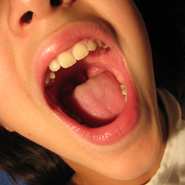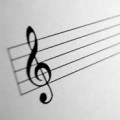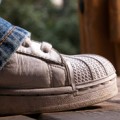This ‘Learn Music Faster’ series of posts highlights things my best students do that contributes towards their success. There are no secret formulae or magic tricks. Learning to play well still requires hard work, dedication and above all, practice. However, my students who do these things seem to improve quicker than the others.
Use your voice
“What?” I hear you cry, “We’re guitarists not singers, we shouldn’t have to engage our vocal chords. That’s not what we signed up for.” But employing your voice while you practice can make an enormous difference to the speed you learn things.
Why is this? The voice is one of the strongest connections we have to our brain. We might look at a piece of music and think we know it, but if we can’t say the rhythm out loud or roughly hum the shape of the music, the chances are we won’t play it well.
I’m definitely not trying to say you need to be a wonderful singer. You don’t. What really helps is just to verbalise things as you are playing or reading, especially if it’s something you’re struggling with.
For example, you might be wrestling with a difficult rhythm. You’ve already simplified it down to just clapping and tapping your foot but you’re still making mistakes. Try actually counting the rhythm out loud as you clap, like “One and ah two and three e and four” (or whatever system you use to count different note lengths).
To start with some people find this harder, because it’s an extra thing to think about. If you feel that, slow it down so you have time to get it all together. As with anything, the more you do it the easier it will get.
Take the time to do this and you will find that you learn rhythms faster and more securely than you did before.
I’ve definitely noticed that there are some students who like to charge headlong into a new piece of music, throwing their fingers at it and hoping it comes out right. Usually it’s ok but a bit scrappy. What’s more those mistakes they’re making never go away.
Other students take a minute at the beginning of a new piece or phrase. They will count out the rhythm aloud, then maybe tap it out while still counting. Then they’ll feel their way through the notes, and start to put ut all together slowly. In a few minutes they’ll be playing it accurately and reliably. The impetuous student may have started quicker, but at this point they’re still playing it with mistakes, and will continue to until they slow it down to work them out.
This echoes the earlier ‘slow and deliberate practice’ post in this series, but the key point is that we can use our voices to accelerate the learning during the slow and deliberate phase, so that we get up to speed and start having fun with it quicker.
As a progression to this verbalising of rhythms, it can be good to do away with the counting and just speak the rhythm phonetically. Any syllable will do. For example, four semiquavers followed by a crotchet for me is “da-ga-da-ga daaaa”. This makes a much more immediate, visceral and emotional connection whith the rhythm than the more cerebral counting method.
If you’re reading music or even tablature you will probably need to be comfortable with the counting method before moving on to the phonetic one. That means you can go back to counting if you need to figure out a particularly troublesome rhythm.
If you learn by ear you might be able to skip straight to the phonetic method, although I strongly recommend you learn about counting rhythms as it will help your overall playing enormously.
Think about it this way, when you learnt to read words you started off by reading out loud. You didn’t have to have a great speaking voice, the simple act of saying the letters and syllables meant you learnt them quicker. Eventually you moved on to reading in your head once you’d done it often enough, but to start with saying the words aloud was by far the best method. If you apply the same method to learning music you’ll progress quicker than those who don’t.
Previously on Learn Music Faster – Listen to Yourself






Pingback: Learn Music Faster - Ask Questions - Matt Helm Guitar
Pingback: Learn Music Faster - Count for Yourself - Matt Helm Guitar